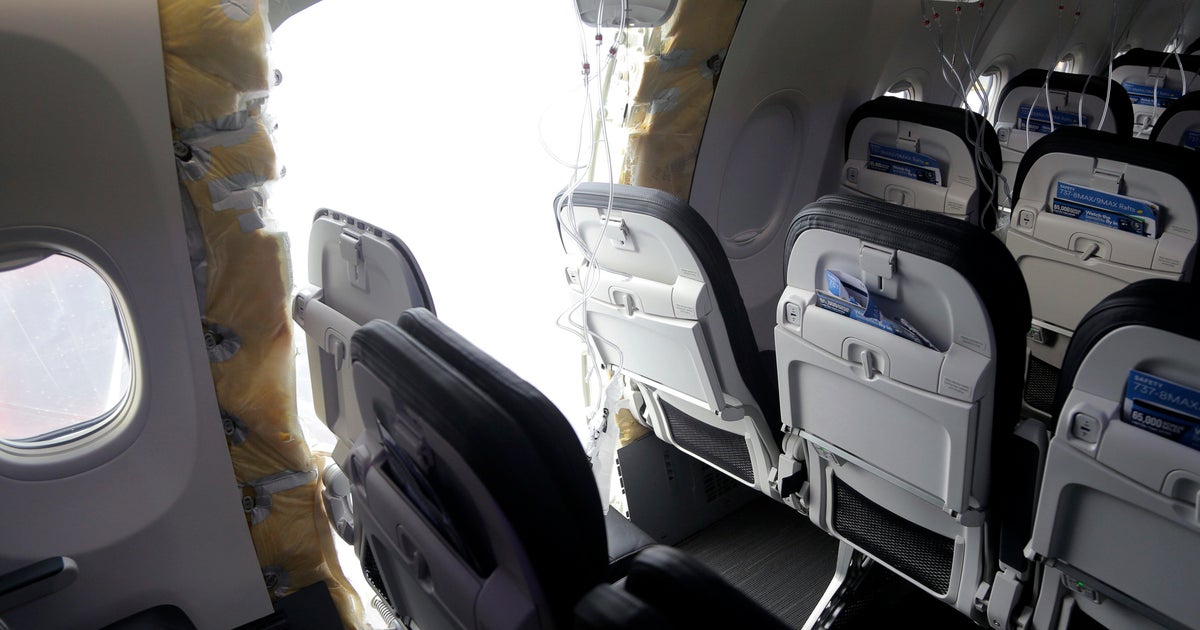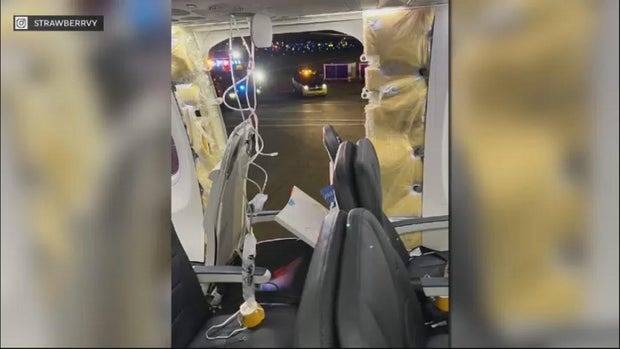The National Transportation Safety Board says the plug covering an unused exit door that blew out minutes into an Alaska Airlines flight Friday evening has been found. The agency’s head said the discovery could prove vital in the investigation of the cause of the blowout, which forced the Boeing 737 Max 9 to return to Portland, Oregon minutes after takeoff.
The Federal Aviation Administration grounded all of the types of Boeing 737 Max 9s involved until it’s “satisfied that they are safe,” an FAA spokesperson said in a statement Sunday.
NTSB via AP
In a news conference Sunday night, National Transportation Safety Board Chair Jennifer Homendy said the plug was found near Portland in the backyard of a schoolteacher she identified only as Bob. “We are really pleased that Bob found this,” she said.
The Reuters news agency says she had earlier told reporters the aircraft part was a “key missing component” in seeking to determine why the accident occurred.
Homendy told reporters pilots reported that the same plane experienced three pressurization warnings, from cockpit dashboard lights, between Dec. 7 and Jan. 4. At least one occurred in-flight.
The plane was just weeks old, delivered at the end of October. Alaska Airlines maintenance crews checked and cleared the light after each illumination.
STRAWBERRVY | INSTAGRAM
On the day before the blowout on Flight 1282, Homendy said, the carrier ordered that the plane involved couldn’t make any long flights over water so it could “return very quickly to an airport” if the warning light appeared again. She stressed that the light might not be related to Friday’s incident. In addition, more maintenance work was ordered — basically a deeper dive into why the light kept illuminating — but none was done before Friday night’s flight.
Homendy described a chaotic scene in the plane’s cockpit and directly outside the cockpit after the blowout.
She said the flight crew heard a bang and the cockpit “door flew open” from depressurization, so they immediately put their masks on, but communication in the cockpit and between the crew members in the cabin and cockpit were very difficult.
The force of the depressurization slammed the cockpit door into the front restroom door, damaging the restroom door, and it took a flight attendant three tries to get the cockpit door to close again, Homendy said.
She noted that the first officer lost her headset and the captain had a portion of her headset pulled off. The captain and first officer couldn’t hear anything in their damaged headsets once they were recovered so they used the overhead speaker to hear.
A quick reference checklist kept within easy reach of the flight crew also flew out the door, Homendy said, adding that it was incredibly loud and chaotic on board.
Homendy said the flight data recorder and cockpit voice recorder were sent to NTSB labs on Sunday to be read. But CBS News senior transportation and national correspondent Kris Van Cleave reports the voice recorder won’t help investigators:
The Reuters news agency says the NTSB has been pressing to have the cockpit voice-recording requirement increased to 25 hours. According to Reuters, Homendy said the FAA proposed a rule in November that would increase the requirement, but only for newly manufactured aircraft.
The FAA’s Emergency Airworthiness Directive grounding many of the the Max 9s impacts about 171 worldwide. Such directives are issued “when an unsafe condition exists that requires immediate action by an owner/operator,” according to the agency.
“The FAA’s first priority is keeping the flying public safe,” the FAA spokesperson said.
What happened on the Alaska Airlines flight?
The flight from Portland, Oregon to Ontario, California was minutes into its journey and had reached approximately 16,000 feet when the door plug blew off, an NTSB official said during a Saturday press briefing. The gaping hole in the side of the jet opened up where Boeing fits a plug to cover an emergency exit that the airline doesn’t use, The Associated Press explained.
Homendy called the event an “accident, not an incident.” She said the plane was forced to return to Portland International Airport just minutes after takeoff “after a mid-cabin door plug … departed the airplane, resulting in rapid decompression.”
The two seats next to the part that tore off were unoccupied, Homendy said. None of the 171 passengers or six crew members suffered serious injuries, Homendy said. The NTSB said Sunday that the plane didn’t sustain any structural damage.
Who is investigating the incident?
The FAA, NTSB, Boeing, Alaska Airlines, Airline Pilots Association and Association of Flight Attendants are all investigating, officials said.
The FBI is also helping local law enforcement locate parts that came off during flight. A spokesperson for the FBI’s Portland office said the agency remained “in an on-call status.”
The NTSB has asked anyone with pictures and videos to reach out to [email protected].
How are airlines and Boeing responding?
In the U.S., only Alaska Airlines and United Airlines use the Boeing 737 Max 9 aircraft.
Alaska Airlines temporarily grounded its entire 737-9 MAX fleet, pending inspections, the company said. The airline said it canceled 160 flights Saturday, impacting roughly 23,000 passengers, another 170 flights on Sunday, impacting about 25,000 passengers, and 60 for Monday. “We expect additional significant cancellations through the first half of the week,” the airline said Sunday night.
United said Sunday that, “Service on United’s Boeing 737 MAX 9 aircraft remains temporarily suspended while it conducts inspections required by the FAA. We’re continuing to work with the FAA to clarify the inspection process and requirements for returning all MAX 9 aircraft to service. We are working with customers to re-accommodate them on other flights and in some cases have been able to avoid cancellations by switching to other aircraft types.”
Agence France-Presse reports that carriers and regulators worldwide grounded some versions of the Boeing 737 MAX 9 jetliners, Turkish Airlines among them.
Boeing has so far delivered about 218 of the 737 MAX planes worldwide, the company told AFP.
A Boeing spokesperson said it fully supported “the FAA’s decision to require immediate inspections of 737-9 airplanes with the same configuration as the affected airplane.”
Boeing President and CEO Dave Calhoun on Sunday told employees he will be holding a “company-wide webcast focused on safety” on Tuesday. He also canceled a leadership summit for Boeing vice presidents that was supposed to take place Monday and Tuesday to “focus on our support to Alaska Airlines and the ongoing National Transportation Safety Board investigation, and any of our airline customers experiencing impact to their fleets,” Calhoun wrote.
Past investigations into Boeing 737 planes
There are currently two versions of the Boeing 737 in service: the Max 8 and the Max 9.
In 2018, a Lion Air flight on a Boeing 737 Max 8 plane crashed into the ocean. The following year, an Ethiopian Airlines plane of the same model crashed shortly after takeoff. More than 300 people died in the two crashes. The jets were grounded in March 2019. The Boeing 737 Max was allowed to return to service late in 2020.
In April, Boeing paused 737 Max production over an issue with aircraft parts.
Homendy said after Friday’s incident that the NTSB does not suspect there is an overall design problem with the plane.



